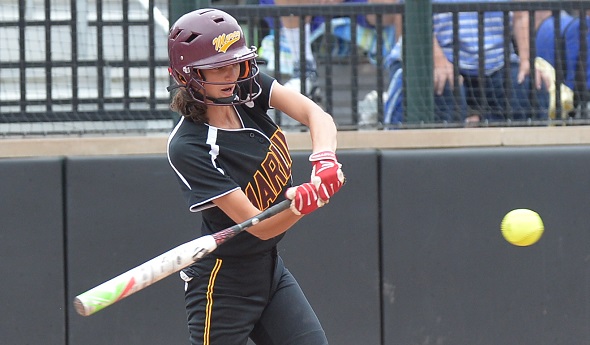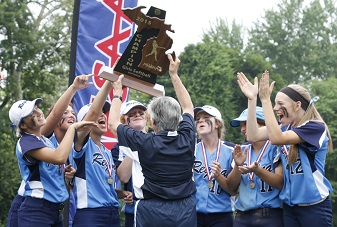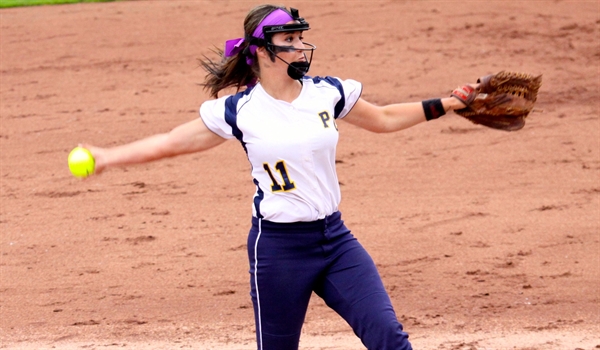
Detroit Powers Succeed Amid Lower Numbers
By
Tom Markowski
Special for Second Half
April 20, 2016
Participation in spring sports, following a similar decline in student-aged population in Michigan, has been on a decline statewide over the last decade.
 But while some like baseball have experienced a slight bounce-back over the last few seasons, softball in particular has seen its numbers continue to fall.
But while some like baseball have experienced a slight bounce-back over the last few seasons, softball in particular has seen its numbers continue to fall.
Coaches and administrators in the Detroit area point to a number of factors intertwined that produced a snowball-like effect – and now it seems to have come to a head.
Three softball programs in the Catholic League Central, a division that competes at a high level statewide, don’t have sufficient numbers to field a junior varsity this spring. Many programs don’t sponsor freshmen teams for the same reason.
But for schools like Birmingham Marian, Farmington Hills Mercy and Livonia Ladywood not to have a junior varsity softball team is quite shocking to some – especially considering that Mercy enters this season ranked No. 3 in Division 1 and Ladywood is No. 2 in Division 2.
Specialization fallout
Marian athletic director Dave Feldman isn’t among those stunned. He saw this coming. Feldman points to the 2007-08 school year when the Michigan High School Athletic Association was forced, by court decision, to switch the volleyball season from the winter to the fall and the girls basketball season from the fall to the winter.
Feldman has a daughter, a freshman at Marian, who participated on the junior varsity volleyball team this fall. When that season was over she joined a club volleyball team. Feldman said the club volleyball season begins in December and continues on into June.
“It’s not AAU,” Feldman said. “But you need to be an AAU member (to play). They play all of the time. Heck, they played on Easter Sunday. And every club is filled.”
The pressure on athletes to play year-round is arguably greater now than it ever has been, and can come from coaches, peers and family – based on a frequent misconception that if athletes want to earn a scholarship, they better keep up with the Joneses or be left behind.
Feldman said he’ll back his daughter with whatever decision she makes. If she wants to play volleyball nine or 10 months a year, he’ll support that. But Feldman said, financially, it’s getting out of hand. He estimated between the cost of airfare, hotels and meals that he’ll spend $6,500 in support of his daughter playing club volleyball.
And, according to Feldman, the increase in attention on volleyball is affecting participation in other sports.
“(Girls) basketball is fighting for its life,” he said. “Our field hockey program (a fall sport) is fine. Our lacrosse teams are fine.
“We have 15 playing volleyball at all three levels. We had 16 (total) try out for softball and we made two cuts. We haven’t had a JV the last two years. The last time we had a freshman (softball) team was in 2004 or 2005. The last few years the numbers have dropped off. It’s the specialization.”
Simply signs of change?
Warren Regina is another member of the Catholic League Central. Regina athletic director Diane Laffey also is the head coach for softball and basketball, and she said she thinks lacrosse has drawn some athletes away from softball – which makes sense, although the total number of girls playing high school lacrosse in Michigan has increased only about 1,000 over the last decade, while softball participation is down 4,000 athletes over the same time.
One should not use Regina as an example of decline – Laffey’s team won the Division 1 championship last spring and fields a softball team at all three levels. At the same time, Regina also has seen a rise in participation in lacrosse. There are 18 playing for both the varsity and junior varsity this spring, the highest participation in school history.
Mercy varsity softball coach Alec Lesko said, simply, that times have changed. Mercy reached the Division 1 Semifinals last season, just as Ladywood did in Division 2 the year before – yet despite this success, Mercy’s number of softball players also has declined.
 “(The students) have many more options,” Lesko said. “In addition to their school work there’s band, theatre, honors society clubs. In the past kids would play three sports and be in the band. All of my daughters were multi-sport athletes. By their sophomore year they had to make a decision (on which sport they would concentrate).
“(The students) have many more options,” Lesko said. “In addition to their school work there’s band, theatre, honors society clubs. In the past kids would play three sports and be in the band. All of my daughters were multi-sport athletes. By their sophomore year they had to make a decision (on which sport they would concentrate).
“It’s also economics. They want to earn a scholarship. You hear horror stories about (the cost of) student loans. Even the big schools have trouble getting the (students to play softball).
“As far as college, and I can only speak about softball, the Big Ten coaches want the player they recruit to play other sports,” Lesko added. “I hope to have a JV program next year. A player that misses 30 JV games, we will feel that crunch later. There are those who think JV softball is a waste of time, that you should just compete in travel (during the summer). We will get some of those kids. Those who compete in travel then come to us as sophomores.”
Reasons for optimism
Don Peters is the softball coach at Clarkston, and between coaching travel and at the high school level he’s put in 35 years. He coached travel before taking over the Clarkston program. Peters said the two complement each another, or at least they should.
“I know some disagree,” he said. “The girls have a lot of choices in the spring. Look at all of the sports they can play. I don’t think lacrosse has cut into the numbers. Not yet, but it’s probably going to. We haven’t been affected. We have 45 (covering three teams) in our program. We really push softball in our community because it’s been established.”
Peters said coaches in softball and baseball need to make the game enjoyable, and one way is to reward those who chose to participate by playing them on a regular basis. A student who is No. 14 or 15 on a squad often will play once a week and, with all of the options available, isn’t willing to put in the practice time for limited game action.
Mercy senior first baseman Abby Krzywiecki played a variety of sports before her freshman year. It was then she decided that softball would be her main sport and she chose to pour all of her energy into it.
She said it’s not all gloom and doom for her sport.
“We had a small freshmen class (last year),” she said. “When I came in we had a large class. It was one of the biggest. It’s not that we’re not getting softball players. In the travel world, it’s becoming more intense. We have more younger people playing. The sport is getting more intense. The talent level is getting higher.”
 Tom Markowski is a columnist and directs website coverage for the State Champs! Sports Network. He previously covered primarily high school sports for the The Detroit News from 1984-2014, focusing on the Detroit area and contributing to statewide coverage of football and basketball. Contact him at [email protected] with story ideas for Oakland, Macomb and Wayne counties.
Tom Markowski is a columnist and directs website coverage for the State Champs! Sports Network. He previously covered primarily high school sports for the The Detroit News from 1984-2014, focusing on the Detroit area and contributing to statewide coverage of football and basketball. Contact him at [email protected] with story ideas for Oakland, Macomb and Wayne counties.
PHOTOS: (Top) A Farmington Hills Mercy hitters prepares to connect during last season's Division 1 Semifinal against Caledonia. (Middle) Warren Regina coach Diane Laffey hoists her team's championship trophy after the Saddlelites downed Caledonia in the Final last spring.

D1 Semis: Pitchers Hit Big for Finalists
June 12, 2014
By Geoff Kimmerly
Second Half editor
EAST LANSING – Portage Central senior Gina Verduczo was maybe a tad bummed as she recalled in detail two walks she gave up Thursday morning. After all, she’d walked at most 10 batters this entire season.
But the Mustangs’ ace also was a little surprised to find out some of her personal highlights in what might be the most memorable game of her high school career – until Portage Central plays again in Saturday’s MHSAA Division 1 Final.
Verduczo threw a no-hitter and drove in the game’s only run in the sixth inning as Portage Central advanced to its first championship game since 1977 with a 1-0 victory over Utica Ford.
She’d glanced at the Secchia Stadium scoreboard a few times. But apparently she missed the “0” in Ford’s hits column indicating her near-perfect performance from the pitching circle.
“My dad was a baseball player; he was a pitcher, and he taught me to focus on the job and hand and not look at what you’ve done,” Verduczo said. “You still have six more outs to go, three more outs to go. Obviously, down to the end, she could’ve gotten a hit. I still had a job to do.”
Portage Central (42-3), ranked No. 3, will try to finish that job against No. 4 Bay City Western in the championship game at 11:30 a.m. Saturday.
Verduczo finished the Semifinal with 11 strikeouts and allowed only those two runners who reached on bases on balls. She closed the game by striking out the side in the bottom of the seventh inning.
As Mustangs coach Tom Hamilton pointed out, Verduczo also knows the disappointment of falling in such a tight game. Portage Central was top-ranked in Division 1 heading into last season’s tournament, but lost to eventual MHSAA champion Mattawan on a walk-off home run in the District Final.
“If there’s a person we’ve got on this team (that) we want on that mound, she’s got that bulldog mentality,” Hamilton said. “This is her moment to shine.
“She’s been in games like that where she’s been on the other end. So it’s nice to see her be on this end of it.”
Portage Central senior outfielder Lea Foerster singled with one out in the sixth inning, and after moving to second on senior Taylor Snyder’s sacrifice came home on Verduczo’s single to right field.
Verduczo had a pair of singles, the only batter in the game with multiple hits.
“We’re excited for the last seven innings,” Verduczo said, referring to Saturday’s Final. “This was one of our goals, and we’re happy to be part of it.”
Utica Ford freshman Nikki Sorgi also was impressive in the circle, allowing only six hits and walking one batter in her team’s first Semifinal appearance. Ford finished 30-9. Click for a full box score.
Bay City Western 2, Romeo 1
Bay City Western (40-3) returned nearly the same lineup that carried the Warriors last season to their first MHSAA championship game in team history. And the lessons learned during that run surely paid off in Thursday’s second Semifinal.
 Western fell behind 1-0 in the fourth inning when Romeo sophomore shortstop Morgan Gardner drilled a Hannah Leppek pitch over the left-field fence – the only home run Leppek has given up this season.
Western fell behind 1-0 in the fourth inning when Romeo sophomore shortstop Morgan Gardner drilled a Hannah Leppek pitch over the left-field fence – the only home run Leppek has given up this season.
“I don’t like that feeling, obviously, and I wasn’t used to it,” said Leppek, an all-stater last season. “I had to teach myself really quickly how to get over it.”
Still, with Romeo pitcher Taylor Weaver also dominating, it began to look like the Bulldogs would be advancing to their first-ever MHSAA Final instead of Western returning.
But Leppek did bounce back quickly. She doubled in the tying run and scored the go-ahead in the sixth inning, and allowed only three hits the rest of the game.
Leppek ended with two hits in three at bats, and struck out six batters while walking only one.
“I learned (in last year’s Final) how to handle my emotions and the stress and the crowd, and everything like that,” Leppek said. “(And) my hits definitely built me back up.”
Sophomore second baseman Kelsie Popp – whose walk-off homer Tuesday pushed the Warriors past Hudsonville 4-2 and into the Semifinals – drove in Leppek with a double.
“She’s starting to learn how to be a clutch hitter, isn’t she,” Western coach Rick Garlinghouse said of Popp. “She comes through. She protects (Meredith) Rousse, (Kaylynn) Carpenter and Leppek in our batting order, and they can’t pitch around those three with her batting fourth. We’re a pretty hard team to beat that way.”
Weaver allowed only four hits, striking out six without allowing a walk. Romeo, ranked No. 2, finished 31-8. Click for a full box score.
PHOTOS: (Top) Portage Central pitcher Kim Verduczo fires a pitch during her Division 1 Semifinal no-hitter. (Middle) Bay City Western pitcher Hannah Leppek unloads a pitch in the Warriors’ Semifinal victory.

